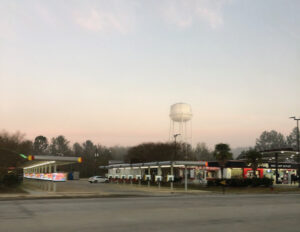
Photo by John Griswold
Men he knew liked to call and say they were rolling out. They were headed out now, they explained, when it did not need to be explained, that they were gonna be rolling through on my way to…. Going to take a slow drive, see what they could see.
When he was younger they made him impatient. He had work he had to get done, and dinner still needed to be made, and some cousin or acquaintance wanted him to take a drive to the next town to see what was going on over there. (Sometimes the man wanted to walk up the pasture just to check things out.) It was clearly a ruse, he saw, with no real goal or task. What was their angle?
They drove in a particular way. Buck, his boss at the rural park district, could make an entire day of driving around to “check” on dumpsters that would be emptied later that week. His bare arm on the windowsill, right hand on the wheel, moving the truck on down the road 10 miles an hour under the speed limit. (Once, a toddler, who had gotten out of the house without her mother knowing, ran out onto the county road, and Buck was able to see her in time, and they rescued her from oncoming traffic.)
The men—it was always older men—left an extra fifteen feet in front of their trucks when they stopped at lights. They never turned on red, even if there were people behind them who needed to get home. They did the minimum speed on the highway and turned to look at every car that passed—not angrily, just sort of curious.
They were older men, some of them merely old before their time, rolling along. They were free men in a free country, possessing the dignity of having worked hard, and now finally having the leisure of not working at the moment. One of them called it looking over his estate, as a joke, but none of them owned much of anything. They did not pretend to kingly. The impulse was more Jeffersonian, a small farmer walking his fields after harvest.
Now, here he was, poking along himself, looking at pines against the red sky. The foggy road through the forest made him slow even more, wary of deer at this hour, which is how he saw the roadside cross with the Batman symbol on it. Slower was why he missed the armed robbery at Oberlin Donut by 20 minutes. The marquee of Choctaw Pines said it was Men’s Day Every Day All Day Thursday. He wondered at that.
The sun rose, but it was a soft morning light, warm on the median grass and against the tree line. He felt the emotion from some event, long ago, without remembering the event. When he was in high school that girl had given him those handwritten letters that were explosively charged with love, and he handled it badly. He had handled many things badly.
But in this mood now he felt at peace driving through the little towns, all of them similar to where he grew up, and, he saw, much like the ones in Russia, Japan, Central America, and everywhere elsewhere. His feelings about them, once invested in failure and disappointment, had burned away and left something stronger and more true.
As he tooled along, his car turned over 100,000 miles. He was a guy who had a car with a 100,000 miles on it. He had a lot of miles on him too. He wondered how many that would be, briefly tried to do the math.
He had the pale blue hours, and after the whole day in the car, a night drive through the eroded mountains more than a billion years old. He was happy to still be alive, pain free, and not in the worst financial shape of his life.
He had the American landscape, with its one hawk every mile on fence posts, like tax collectors.
